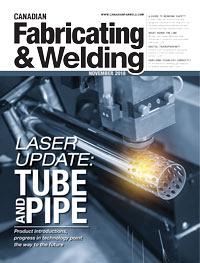- FMA
- The Fabricator
- FABTECH
- Canadian Metalworking
Punch performance: Keeping the simple jobs simple
Toronto-based Toro Group right-sizes its press needs with air/oil-based system
- December 10, 2018
- Article
- Fabricating
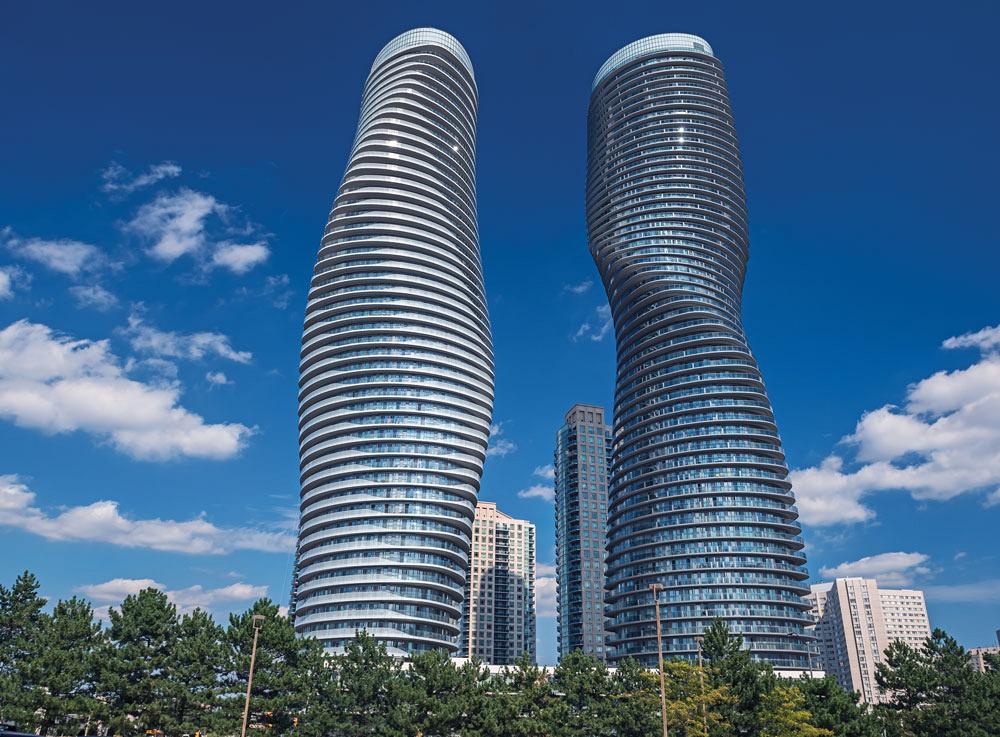
Regardless of the complexity of a design, some jobs require the use of a relatively simple tool. For instance, Toro Group of Companies, which develops and manufactures aluminum products for office buildings and high-rise condos like these towers in Mississauga, Ont., right-sizes its press needs with an air/oil-based system.
The sophistication of punch presses and roll forming equipment today allows fabricating shops to do a tremendous amount of work on one machine. However, there are plenty of shops that don’t require such sophisticated machines; those shops simply need a versatile tool that will allow them to efficiently and consistently punch out holes in their parts.
The Toro Group of Companies is one such business. This Toronto-based organization develops and manufactures aluminum products for high-rise condominiums, office buildings, and hotels throughout North America. These products include balcony railings, entrance systems, window and door frames, prefabricated shower doors, and curtain walls.
For a variety of jobs, Toro simply requires that a hole be punched at the end of a pre-formed profile.
“If you only have to make one hole, you can do this on a CNC machine, but that’s like using a big gun for hunting a small animal,” said Eugene Boyko, CET, research and development coordinator for Toro. “To make one hole it is faster to use a different tool.”
Since 2003 Boyko has been using air-over-oil presses manufactured by Bolton, Ont.-based Multicyl Inc. for such jobs.
Quiet Power
The patented design of Multicyl’s cylinders is relatively straightforward: You put air in one end using a regular air valve, and you get hydraulic power out of the other end of the cylinder.
The element that has been patented is the “flow-by” principle, which allows the two-stage pressure intensifier to self-adjust anywhere on the overall stroke. This means the cylinder will stall when it meets resistance greater than the force on the advanced stroke.
For the user, this equates to lower air consumption, as the power is produced only when you need it – the cylinder comes down slowly until it meets with resistance. This also means that there is no need to set the tooling to a precise height (as is necessary with a mechanical press) as the hydraulic action just “bottoms out” whenever the resistance is greater.
Boyko sees a number of advantages in this design.
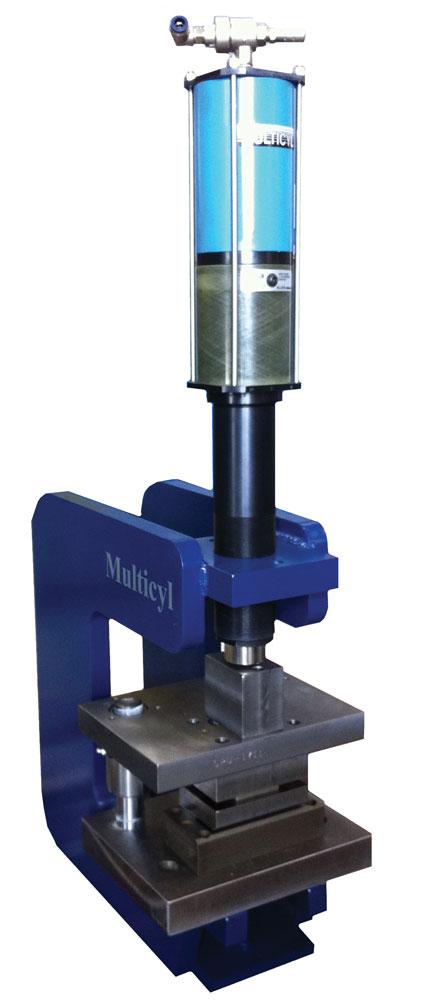
Toro Group works with Multicyl punches for a variety of reasons, one of them being ease of use. A good example of this is the company's MC series (single-acting) cylinder, pictured here. While these can power a single unitized application, they can also be adapted for multiple tools and other small tooling applications. The C-frame cage allows the fabricator to easily switch out tooling for different types of jobs, such as tube piercing, notching, and clinching tools, in addition to standard hole punching.
“A cylinder provided by Multicyl that can provide up to 40 tons of pressure is much quieter than what you would have if you used a hydraulic station,” said Boyko. “If you used a pneumatic piston, on the other hand, it would be much larger. The simple operation and compact size was an initial draw for me to look at Multicyl. The ability to create a high variety of punching stations without the use of electrical power in place or a need to use complicated hydraulics was very appealing.”
Consistent Power
One punch that Toro purchased from Multicyl 16 years ago is still running, and Boyko said he has never had to fix it or add oil to it.
“It runs on a semi-automated line,” he explained. “The punch punches a hole and a saw cuts it to create a 4-inch bracket. The material is automatically fed through the machine, so it goes punch, cut, punch all day.”
Boyko has called upon Multicyl to help him with unique applications in his shop as well.
“They designed and made for us a very complicated punch which actually I did not even think would be possible to do,” said Boyko. “We needed a punch to punch out from the inside of a tube a certain distance from the end of a profile. This was to assist with water drainage in the final product. Multicyl delivered this to us and we have been using it for five years.”
Boyko is now working with the second generation of the family-owned business, so he has a very good working relationship with the company.
“Multicyl is local, the product works, and it is relatively inexpensive, which are very important,” said Boyko. “And in 16 years working with the company, I have ordered spare parts just two times, and I have more than 50 Multicyl [punches] in our shops.”
He also noted that when he wants to adapt a punch to work on a different job, the variety of cages available makes the switchout simple.
“The beauty is, you can take the punch out and put in a different one for different jobs,” he explained.
Todd Bryson, vice president of operations for Multicyl Inc., said that the applications Boyko describes are a good example of the “sweet spot” for his company’s product.
“It is great for short runs and dedicated machines because it is small, compact and inexpensive, so you’re not tying up a large, expensive press; yet at the same time, if you have multiple dies you need to change for production runs, we can handle that as well.”
Toro Group of Companies, www.toroaluminum.com/companies
Multicyl Inc., www.multicyl.com
subscribe now


Keep up to date with the latest news, events, and technology for all things metal from our pair of monthly magazines written specifically for Canadian manufacturers!
Start Your Free Subscription- Trending Articles
FMA Annual Meeting: Ingenuity still key with tech innovations

Messer Canada hosts anniversary event

Welding jacket designed for protection, comfort

Compact swing chamber shot blast machine features robotic workpiece handling
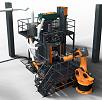
Gang punching press system accommodates different parts quickly
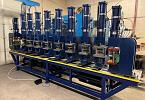
- Industry Events
MME Saskatoon
- May 28, 2024
- Saskatoon, SK Canada
CME's Health & Safety Symposium for Manufacturers
- May 29, 2024
- Mississauga, ON Canada
DiPaolo Machine Tools Open House 2024
- June 4 - 5, 2024
- Mississauga, ON Canada
FABTECH Canada
- June 11 - 13, 2024
- Toronto, ON Canada
Zoller Open House & Technology Days 2024
- June 12 - 13, 2024
- Ann Arbor, MI













